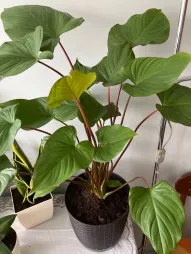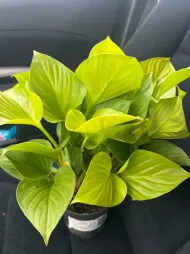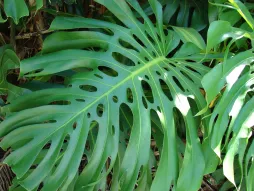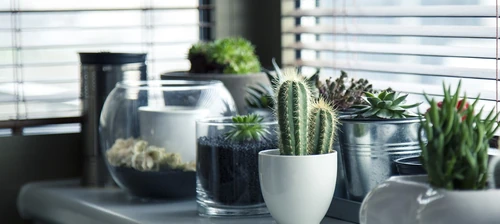Homalomena rubescens, queen of hearts
What if the most romantic plant wasn't the heart chain, the rose or the camellia, but the Homalomena rubescens? With its heart-shaped leaves and blushing stems, this species native to northern India and Myanmar has what it takes to stir passions.
How to recognize Homalomena rubescens?
Homalomena rubescens is an upright perennial. Even in pots and indoors, it can grow to over a metre in height with a 60-centimetre spread.
The plant grows from long, thin, reddish-brown rhizomes.
Stems and petioles are also red. Stalks reach 75 centimetres in length.
They support fleshy, glossy, textured leaves. Young leaf blades are triangular, but mature leaves become cordate. The largest are 35 centimetres long and 25 centimetres wide.
Leaf color varies according to variety. Botanical Homalomena rubescens has plain foliage. Dark green on the upper surface, the leaf blades have a lighter underside. However, there are also cultivars with light-green foliage, such as homalomena 'Lemon Lime, or silvery glitter Homalomena 'Stardust
Homalomena rubescens is mainly grown for its decorative foliage. The flowers are less than three centimetres long and grow close to the ground. The inflorescence consists of a burgundy-red spathe and a white spadix.
The fruit is a fleshy berry containing the seeds.
When you cut one of its leaves, Homalomena rubescens gives off a scent of aniseed. But resist the urge to taste it! The whole plant is toxic. Its sap contains calcium oxalate crystals, which are harmful when ingested. It can also cause skin irritation. Keep your specimen away from young children and pets.
Our maintenance tips
Don't know when to water your Homalomena rubescens? Watch your plant! When it's thirsty, the stems and leaves droop. You need to water it right away.
Watering
Water only when the substrate has dried on the surface (one or two centimeters).
Use non-calcareous water, such as rainwater or mineral water, at room temperature. Pour it over the soil, avoiding the foliage.
To prevent root rot, remove any water that collects in the dish or planter.
Spray
Spray foliage with water at room temperature. Do not use tap water. It is often too hard and leaves marks on the leaves.
Fogging temporarily increases humidity and combats the appearance of parasites.
Repotting
In spring, transfer your Homalomena rubescens to a larger pot, so that it can continue to grow.
Choose a pierced pot one size larger than the previous one. Line the bottom with a drainage layer. You can make a bed of clay balls or gravel.
Homalomena rubescens require rich, well-drained soil. You can use potting soil for green plants with perlite. After covering the drainage layer with this mixture, plant your subject in the center of the pot. Add substrate and tamp down.
Water to encourage rooting.
Fertilization
You can stimulate the development of your plant during its growth phase, in spring and summer, with fertilizer.
Apply a liquid fertilizer for green plants to stimulate growth.
Cleaning
Place your Homalomena rubescens in its pot in the shower or bathtub. Turn the tap on to warm water and water the foliage.
The water removes dust and eliminates certain pests. The shower also helps to temporarily increase humidity.
Prune
To encourage the growth of your Homalomena rubescens, prune regularly.
You can remove the yellowed leaves.
Cutting
Cutting is carried out during the strong growth phase, generally in spring and early summer.
Carefully dig up your Homalomena rubescens. Locate a rhizome with at least two or three shoots. Separate it from the mother plant with a clean, sharp knife or pruning shears. Remove leaves, rhizome and roots.
Choose a pierced pot of a size suited to your cutting. For example, for a plant with four or five leaves, choose a fourteen-centimeter diameter pot.
Prepare a mixture of green potting soil (90%) and perlite (10%). Fill the bottom of the pot with a layer of substrate. Plant your homalomena rubescens in the center and add potting soil.
Water generously and place your cutting in partial shade.
Information
| Family | Araceae - Araceae |
| Type | Homalomena - Homalomena |
| Species | Homalomena rubescens - Homalomena rubescens |
| Lifecycle | Perennial |
| Foliage | Evergreen |
| Exposures | |
| Substrat | |
| Planting methods |
In pots In tubs |
| Categories | |
| Tag |
Fritillary |
| Origin |
Southeast Asia |
| Hardiness (USDA) | 11b |
| Leaf color |
|
| Flower colors |
|
Discover plants from the same family

Homalomena 'Maggy
Discover

Homalomena 'Lemon Lime'
Discover

Monstera deliciosa
Discover

Monstera variegata
Discover


















